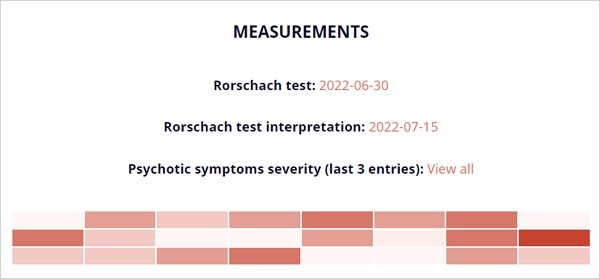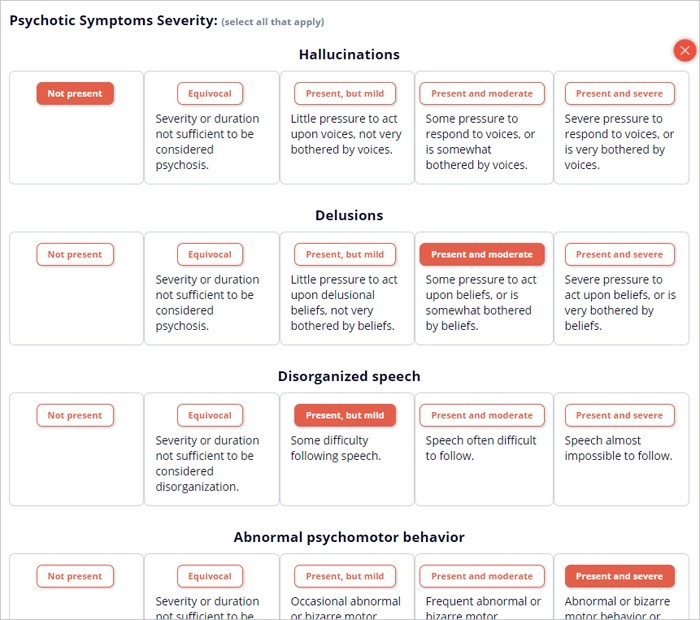|
<< Click to Display Table of Contents >> Psychometrics |
  
|
|
<< Click to Display Table of Contents >> Psychometrics |
  
|
The diagnostic criteria are well-established measures that have undergone extensive review. In addition to providing diagnosis-specific informative text and interactive scales, and to further facilitate patient assessment, the DxP provides psychometric tools to aid in a comprehensive evaluation of individuals that will contribute to a diagnosis and treatment plan tailored to the individual presentation and context. These optional psychometric measures provide the clinician with quantitative assessments of important clinical areas and are designed to be used for the evaluation of the patient’s current status, to monitor changes, and to assist with informed case formulation and treatment planning. You can view and access the available measurements associated with the patient in the 'Measurement' section of the diagnosis Summary report.

When applicable, links are provided to the patient’s Rorschach test coding and interpretation records, and to the patient's Psychotic symptoms severity scale.
In the DxP the Psychotic Symptoms Severity (PSS) scale is presented as an optional specifier in many psychotics disorders and is developed to monitor the presence and severity of eight psychotic symptoms on a 5-point scale, from 'not present' to 'present and severe'.

The PSS 8 psychotic symptoms:
Hallucinations
Delusions
Disorganized speech
Abnormal psychomotor behavior
Negative symptoms
Impaired cognition
Depression
Mania
Each symptom has one of the 6 scale values:
1 (=none)
2 (=equivocal)
3 (=present, but mild)
4 (=present and moderate)
5 (=present and severe)
NA (=no entry)
For more information about the PSS scale, see here.
Export Format: Psychotic Symptoms Severity (PSS) scale
The program export a CSV (comma separated variables) text file in the following format: [Patient Id],[Gender],[Age],[Education],[Marital Status],[Socioeconomic],[Settings],[Entry time yyyy/mm/dd/hh/mm],[Hallucinations],[Delusions],[Disorganized speech],[Abnormal psychomotor behavior],[Negative symptoms],[Impaired cognition],[Depression],[Mania] Demographic variables values: Gender: F (= Female), M (= male), X (= Other) Age: YY.MM Education: N/A (= Not specified), 1 (= Elementary), 2 (= High school), 3 (= Undergraduate), 4 (= graduate) Socioeconomic: N/A (= Not specified), 1 (= Lower), 2 (= Middle), 3 (= Upper) Marital status: N/A (= Not specified), 1 (= Single/Never married), 2 (= Married), 3 (= Living with parents), 4 (= Separated/Divorced), 5 (= Remarried), 6 (= Widowed) Settings: N/A (= Not specified), 1 (= Inpatient/Outpatient), 2 (= Psychiatric evaluation), 3 (= Psychotherapy), 4 (= Educational), 5 (= Research), 6 (= Vocational) |